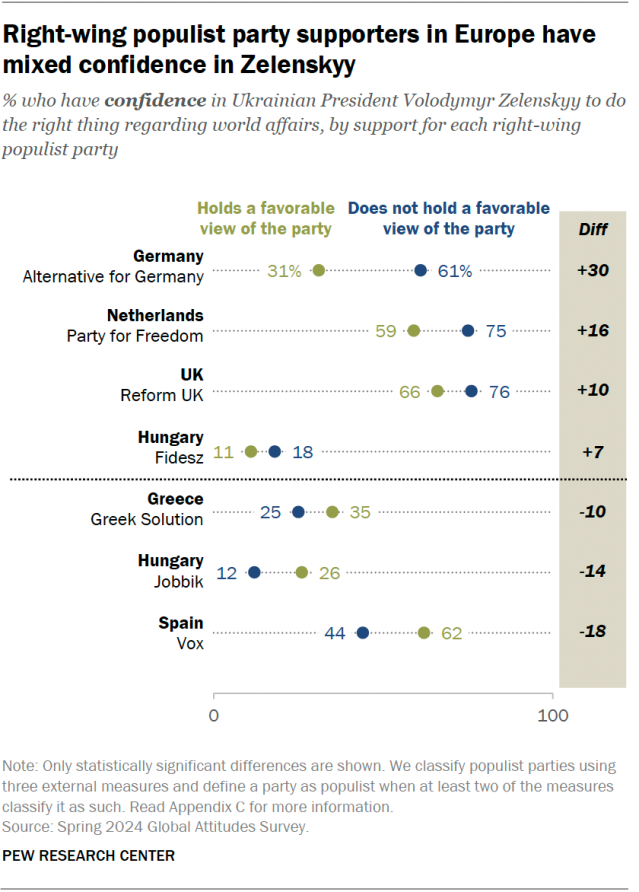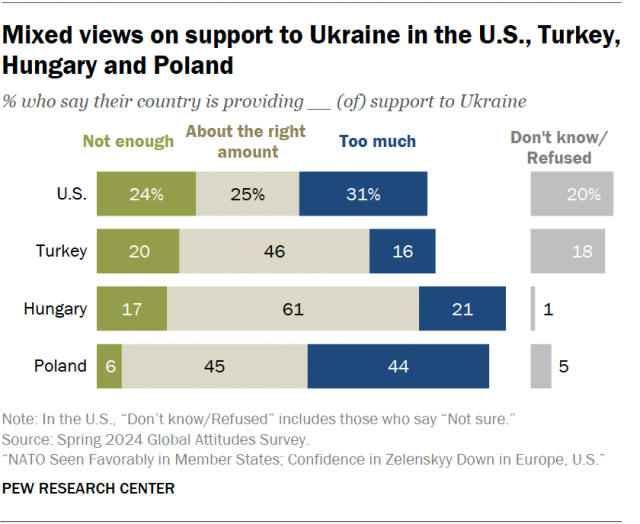Here are key takeways about how people around the world see Ukrainian President Volodymyr Zelenskyy and the country he leads:
- Confidence in the Ukrainian president is mixed across the 35 countries we surveyed. A median of 40% have confidence in him to do the right thing regarding world affairs, while 46% do not.
- Confidence in Zelenskyy has declined significantly over the past year in some countries where trend data is available.
- In a handful of places, about a fifth or more of the public do not express an opinion on Zelenskyy. This includes 45% of adults in India.
- People in Hungary, Poland, Turkey and the U.S. differ in how they view the level of support their country provides to Ukraine.
The share of people with confidence in Zelenskyy differs considerably across countries in Europe and North America. Confidence is highest in Sweden, where eight-in-ten have confidence in him. About two-thirds or more in Canada, the Netherlands and the UK also express confidence. However, six-in-ten or more in Greece, Hungary and Italy do not have confidence in Ukraine’s president.
People in Australia, Bangladesh, Japan, the Philippines and South Korea express more confidence than not in Zelenskyy. The opposite is true in Malaysia, Singapore and Thailand. Confidence in him is mixed or negative across the Middle East-North Africa region, and in the sub-Saharan African and Latin American countries we polled.
How confidence in Zelenskyy has changed over time
Confidence in Zelenskyy has declined significantly in some countries since 2023 – most notably in Ukraine’s neighboring country of Poland. Among Poles, 48% have confidence in Zelenskyy, down from 70% in 2023 (-22 points). Confidence in him has also decreased by double digits in South Korea (-15) and South Africa (-12). Decreases are smaller but still statistically significant in Australia, France, Germany, the Netherlands, Spain, Sweden and the U.S.
How confidence in Zelenskyy varies within countries

Opinions of Zelenskyy differ by political ideology. In the U.S., for example, liberals are more than twice as likely as conservatives to express confidence in him. People on the ideological left are also more likely to have confidence in Zelenskyy in Australia, Canada, Germany, Hungary, the Netherlands and Turkey.
This pattern is flipped in several countries. In Bangladesh, Brazil, Colombia, Greece, Mexico, South Korea and Spain, people on the ideological right are more confident in Zelenskyy than those on the left. (Those on the left in Bangladesh are less likely to offer an opinion.)
In several European countries, people who have favorable views of right-wing populist parties are less likely to have a positive view of Zelenskyy. In Germany, for example, supporters of Alternative for Germany (AfD) are about half as likely as those who do not support AfD to express confidence in the Ukrainian leader (31% vs. 61%). In some cases, the pattern is reversed: Spanish supporters of the right-wing populist party Vox are more confident in Zelenskyy than nonsupporters. (For more information on how we categorize populist party support, read Appendix C.)
Views of aid to Ukraine

In four countries – Hungary, Poland, Turkey and the U.S. – we asked people how they view their nation’s level of support to Ukraine in its war with Russia. In Hungary and Turkey, the most common view is that their country is providing about the right amount of support to Ukraine (61% and 46%, respectively).
People in Poland are split, with nearly identical shares saying their country is providing too much (44%) or the right amount of support (45%) to Ukraine. Only 6% say Poland is not providing enough aid to Ukraine.
In the U.S., 31% of Americans say their country is providing too much support to Ukraine, 24% say it is not providing enough and 25% say it is giving about the right amount. The U.S. is the only place surveyed where there are significant differences on this question by ideology: 51% of Americans who place themselves on the right say the U.S. is providing too much support to Ukraine, compared with only 13% among those on the left.
Related: Americans’ views of Ukraine and U.S. involvement with the Russia-Ukraine war




